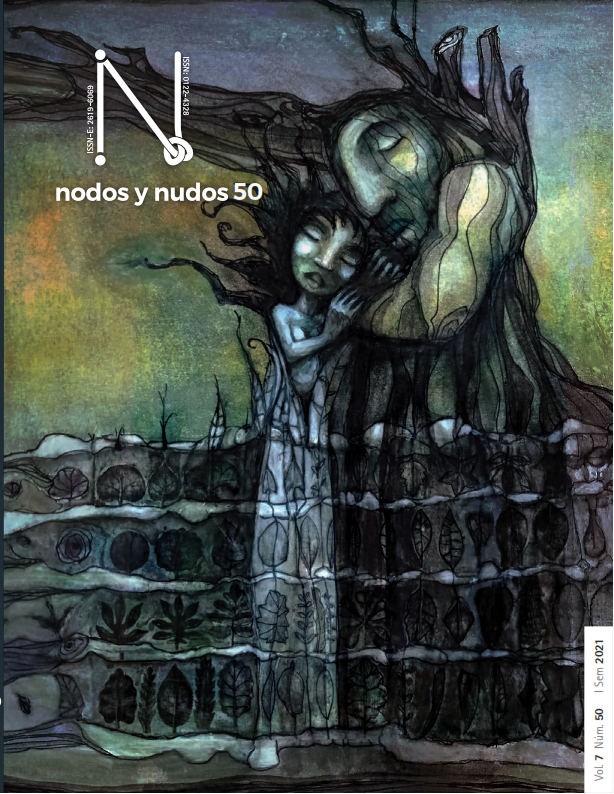“Me dicen negro, pero eso ya no es una molestia para mí”: historias de agencia racial en la escolaridad chilena
Resumen
¿Qué nos dicen las historias de vida sobre la agencia racial de los estudiantes negros en contextos educativos? ¿Qué nos dicen estas historias sobre los límites, desafíos y posibilidades del discurso sobre la inclusión de niños, niñas y jóvenes negros e inmigrantes en la escolaridad? En este artículo de investigación presento las experiencias raciales de Henry y Michelle, dos estudiantes haitianos en el sistema educativo chileno. Para ello se implementaron técnicas de investigación narrativa, evidenciando que, contrario a estudios en los cuales los estudiantes negros son posicionados como receptores pasivos de la violencia racial o como víctimas, Henry y Michelle despliegan una serie de mecanismos emocionales y personales para responder a microagresiones raciales en el sistema educativo. Esta agencia racial les permite enfrentar la marginalización en la clase en una dinámica constante de reconstrucción de sus identidades matemáticas y raciales.
Citas
Alvermann, D. E. (2002). Narrative approaches. En M. Kamil, P. Mosenthal, P. D. Pearson y R. Barr (Ed.), Methods of literacy research: The methodology chapters from the handbook of reading (pp. 47-64). Erlbaum.
Audebert, C. (2017). The recent geodynamics of Haitian migration in the Americas: Refugee or economic migrants. Revista Brasilera de Estudios Políticos, 34(1), 55-71. DOI: https://doi.org/10.20947/S0102-3098a0007
Bonilla-Silva, E. (2012). The invisible weight of whiteness: The racial grammar of everyday life in contemporary America. Ethnic and Racial Studies, 35(2), 173-194.
Bonilla-Silva, E. (2019). Feeling race: Theorizing the racial economy of emotions. American Sociological Review, 84(1), 1-25. DOI: https://doi.org/10.1177/0003122418816958
Castillo, D., Santa-Cruz, E. y Vega, A. (2018). Estudiantes inmigrantes en escuelas públicas chilenas. Calidad de la Educación, 49, 18-49. DOI: https://doi.org/10.31619/caledu.n49.575
Castillo, E. (2016). Las niñas y niños del destierro: Indígenas y afrodescendientes en la ciudad. Nodos y Nudos, 5(41), 57-66. DOI: https://doi.org/10.17227/01224328.6710
Cerón, L., Pérez, M. y Poblete, R. (2017). Percepciones docentes en torno a la presencia de niños y niñas migrantes en escuelas de Santiago: Retos y desafíos para la inclusión. Revista Latinoamericana de Educación Inclusiva, 11(2), 233-246. DOI: https://doi.org/10.4067/S0718-73782017000200015
Darragh, L. y Radovic, D. (2019). “To Tia with love”: Chilean mathematics teacher identities after professional development. zdm Mathematics Education, 51(3), 517-527. DOI: https://doi.org/10.1007/s11858-018-01023-7
De Freitas, E. y Walshaw, M. (2016). Alternative theoretical frameworks for mathematics education research: Theory Meets Data. Springer. DOI: https://doi.org/10.1007/978-3-319-33961-0
Departamento de Extranjería y Migración (2020). Reporte migratorio sobre población migrante en Chile. https://www.extranjeria.gob.cl/media/2019/06/Memoria-Digital-
-Departamento-de-Extranjer%C3%ADa-y-Migraci%C3%B3n.pdf
Elliot, J. (2005). Using narrative in social research. Sage. DOI: https://doi.org/10.4135/9780857020246
Foucault, M. (1982). The subject and power. Critical Inquiry, 8(4), 777-795. DOI: https://doi.org/10.1086/448181
González, C. (2014). Esclavos y esclavas demandando justicia. Chile, 1740-1823. Documentación judicial por carta de libertad y papel de venta. Editorial Universitaria.
González, M. (2016). Narrar-nos es formar-nos: Las historias de vida en la formación de maestros. Nodos y Nudos, 4(40), 103-116. DOI: https://doi.org/10.17227/01224328.5250
Hall, S. (1997). The spectacle of the other. En S. Hall (Ed.), Representation: Cultural representation and signifying practices (pp. 223-290). Sage.
Haslam, N. (2006). Dehumanization: An integrative review. DOI: https://doi.org/10.1207/s15327957pspr1003_4
Personality and Social Psychology Review, 10(3), 252-264.
Martin, D. (2009). Researching race in mathematics education. Teachers College Record, 111(2), 295-338. DOI: https://doi.org/10.1177/016146810911100208
Martínez Peria, J. F. (2009). Haití: La revolución olvidada. E-l@tina, Revista Electrónica de Estudios Latinoamericanos, 7(27), 3-30.
Membe, A. (2017). Critique of black reason. Duke University Press. DOI: https://doi.org/10.2307/j.ctv125jgv8
Ministerio de Educación de Chile (2015). Ley de inclusión escolar.
Montero, M. K. y Washington, R. (2011). Narrative Approaches. Exploring the phenomenon and/or method. En N. Duke y M. Mallete (Eds.), Literacy Research Methodologies (pp. 331-352). The Guilford Press.
Neely, B. y Samura, M. (2011). Social geographies of race: Connecting race and space. Ethnic and Racial Studies, 34(11), 1933-1950. DOI: https://doi.org/10.1080/01419870.2011.559262
Pavez-Soto, I., Ortiz-López, J. E., Sepúlveda, N., Jara, P. y Olguín, C. (2019). Racialización de la niñez migrante haitiana en escuelas de Chile. Interciencia, 44(7), 414-420.
Poblete, R. (2018). El trabajo con la diversidad desde el currículo en escuelas con presencia de niños y niñas migrantes: Estudio de casos en escuelas de Santiago de Chile. Perfiles Educativos, 40(159), 51-65. DOI: https://doi.org/10.22201/iisue.24486167e.2018.159.58202
Poblete, R. y Galaz, C. (2008, September 2-21). Identity at the crossroad: Peruvian immigration and education in contemporaneous Chile. [Ponencia] ii International Congress of Ethnography and Education. Immigration and Citizenship.
Emigra, Barcelona, España.
Restrepo, E. (2013). Etnización de la negridad: La invención de las “comunidades negras” como grupo étnico en Colombia. Editorial Universidad del Cauca
Riedemann, A. y Stefoni, C. (2015). Sobre el racismo, su negación y las consecuencias para una educación anti-racista en la enseñanza secundaria chilena. Polis, Revista DOI: https://doi.org/10.4067/S0718-65682015000300010
Latinoamericana, 14(2), 191-216.
Riessman, C. (2001). Analysis of personal narratives. En J. Gubrium y J. Holstein (Eds.), Handbook of Interview Research (pp. 695-710). Sage. DOI: https://doi.org/10.4135/9781412973588.n40
Salvo, J. (2013). El componente africano de la chilenidad. Persona y Sociedad, 27(3), 53-77. DOI: https://doi.org/10.53689/pys.v27i3.49
Segato, R. (2007). La nación y sus otros: Raza, etnicidad y diversidad religiosa en tiempos de políticas de la identidad. Prometeo Libros.
Solorzano, D. (1997). Images and words that wound: Critical race theory, racial stereotyping and teacher education. Teacher Education Quarterly, 24(3), 5-19.
Tedlock, B. (2011). Braiding narrative ethnography with memoir and creative. En N. Denzin y Y. Lincoln (Eds.), The sage handbook of qualitative research (pp. 331-339).
Sage.
Tijoux, M.E. (2013). Las escuelas de la inmigración en la ciudad de Santiago: Elementos para una educación contra el racismo. Polis, 35, 1-15. DOI: https://doi.org/10.4067/S0718-65682013000200013
Tijoux, M. E. y Díaz, G. (2014). Inmigrantes, los “nuevos bárbaros” en la gramática biopolítica de los Estados contemporáneos. Quadranti-Rivista Internazionale di Filosofia Contemporanea, 2(1), 283-310.
Trouillot, M. R. (1994). Culture, color and politics in Haiti. En S. Gregory y R. Sanjek (Eds.), Race (pp. 146-174). Rutgers University Press.
Trouillot, M. R. (2012). An unthinkable history: The Haitian revolution as a non-event. En A. Goldstein (Ed.), Haitian history: New perspectives (pp. 33-52). Routledge.
Trujillo, I. y Tijoux, M.E. (2016). Racialización, ficción, animalización. En M. E. Tijoux (Ed.), Racismo en Chile: La piel como marca de la inmigración (pp. 49-63). Editorial Universitaria.
Valoyes-Chávez, L. (2019). On the making of a new mathematics teacher: Professional development, subjectivation, and resistance to change. Educational Studies in Mathematics, 100(2), 177-191. DOI: https://doi.org/10.1007/s10649-018-9869-5
Valoyes-Chávez, L. (2018). Racism and mathematics education in a racial democracy: Views from the classroom. En U. Gellert, C. Knipping y H. Straehler-Pohl (Eds.), Inside DOI: https://doi.org/10.1007/978-3-319-79045-9_8
the mathematics class: Sociological perspectives on participation, inclusion, and enhancement (pp. 167-189). Springer.
Weheliye, A. (2014). Habeas viscus: Racializing assemblages, biopolitics, and black feminist theories of the human. Duke University Press. DOI: https://doi.org/10.1515/9780822376491
Wilderson, F. B. (2020). Afropessimism. Liveright.
Descargas
Derechos de autor 2021 Nodos y Nudos

Esta obra está bajo una licencia internacional Creative Commons Atribución-NoComercial 4.0.















